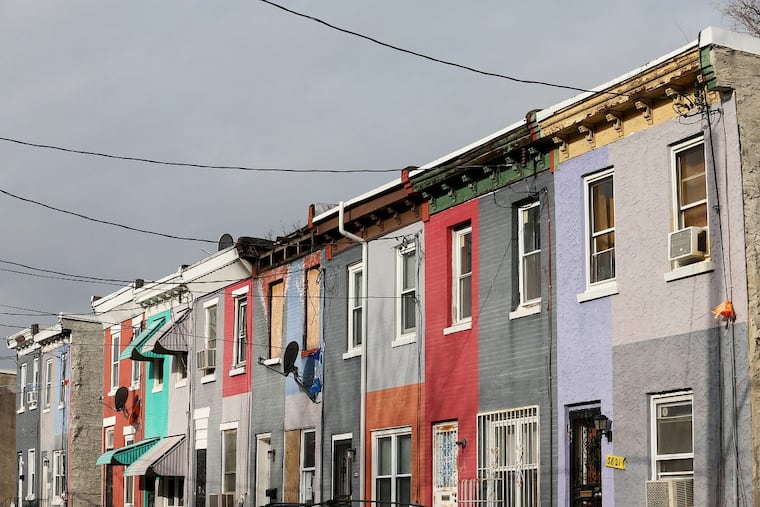Subsidized housing can change lives. Now it's facing deep cuts | Opinion
The 2019 budget released by the White House calls for deep cuts, $8.8 billion or an 18.3% reduction, to the Department of Housing and Urban Development. This would reduce the availability of subsidized housing and vouchers, like the Housing Choice Voucher Program that allowed Paloma to rent a home, even with her very low income.

Paloma was homeless and 19 years old when she joined the Kensington Welfare Rights Union (KWRU). By the time I met her nearly a decade later, the energetic, witty, 28-year-old mother of three young children had a secure home because of KWRU's help in getting her a housing voucher. This provided Paloma and her family with a measure of stability and allowed her to pay it forward by helping others in need.
But the program that changed Paloma's life is now under threat.
The 2019 budget released by the White House calls for deep cuts, $8.8 billion, or an 18.3 percent reduction, to the Department of Housing and Urban Development. This would reduce the availability of subsidized housing and vouchers, like the Housing Choice Voucher Program that allowed Paloma to rent a home, even with her very low income.
These proposed cuts would come at a terrible cost to the country's poor. And they will hit Philadelphia especially hard.
The need for groups like KWRU, a unique group of and for poor people in Philadelphia, never seems to lessen. While the national poverty rate has declined, Philadelphia's poverty rate has not. It is the poorest big city in the United States, as it has been for a decade. Nearly 26 percent of people in Philadelphia live under the poverty line, compared with 12.7 percent nationwide.
Being in poverty means struggling to meet basic needs and cover fundamental costs. Housing insecurity is common.
Even a one-bedroom rental is out of reach for people living in poverty. The national average to afford a one-bedroom rental is a household income of $17.14 per hour. In Philadelphia, it's $19.29 per hour. This makes the need for affordable housing particularly extreme here.
Stable and affordable housing for a family in poverty can be deeply transformative. I interviewed and spent time with dozens of women and their families living in poverty in Philadelphia. Those with housing vouchers were better positioned for work and their kids were less likely to switch schools. Better yet, they could help others in need and build supportive relationships.
People often come to KWRU when their situations are dire, as Paloma did, when they desperately need a place to live and feel they have nowhere else to turn. CC was homeless as well, having fled an abusive relationship, leaving behind her youngest children. She needed stable housing to make a home and regain custody of her children. While helping her navigate the bureaucracy to get a housing voucher, KWRU also provided her with a temporary place to live. Sometimes longer-term members with stable housing, like Paloma, allow new homeless members to stay with them temporarily, offering them companionship and advice as well as a safe place to stay.
These stories point to the need for more funding, not less. While the White House proposes major cuts to affordable-housing programs, 8.3 million households nationwide qualify for housing assistance but can't get it.
There are already long waiting lists for housing vouchers, so long that today in Philadelphia the list is closed to new applicants. There is nowhere in the country where someone making minimum wage can afford to rent a two-bedroom apartment. And there are only 12 counties where a minimum-wage worker can rent a one-bedroom. Yet only about one-quarter of very low-income renters receive housing assistance.
Seeking a place to sleep every day expends emotional and mental energy; stable and affordable housing allows people to invest in developing meaningful relationships, finding work, and caring for their children. A housing voucher was transformative for Paloma and her children, but its benefits also had ripple effects. Beyond a place to stay, Paloma provided homeless KWRU members temporary peace of mind, home-cooked meals, an ear, and the shoulder of someone who had faced the same difficulties they had.
If HUD cuts are implemented, those who already have vouchers will see rent increases they can't afford. And there will be fewer opportunities for poor families to help one another and develop supportive social ties. Homelessness and housing insecurity are likely to rise as a result. The effect in the poorest big city in the United States will be profound.
Joan Maya Mazelis is associate professor of sociology and an affiliated scholar at the Center for Urban Research and Education at Rutgers University-Camden. Her book, Surviving Poverty: Creating Sustainable Ties Among the Poor, is available from NYU Press. Follow @JoanieMazelis